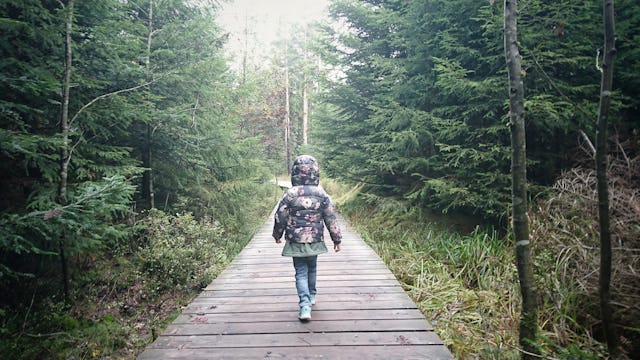A Greener Childhood Can Mean Less Mental Health Disorders In Adulthood

A childhood spent among trees and green space can mean a mentally healthier adulthood
As our world develops more and more with urban spaces replacing green ones, it’s natural to wonder if a lack of trees can affect a person’s mental health. Scientists in Denmark set out to discover exactly that — and their findings are striking.
A study published in the journal PNAS by researchers from Aarhus University in Denmark explains the findings of what scientists say is the largest investigation into what being surrounded by green spaces growing up means for adulthood mental health. It was discovered that growing up near vegetation can mean a 55 percent lower risk of mental health disorders in adulthood. Which is a pretty significant stat.
The study’s lead scientist, Kristine Engemann, tells NPR it was a combination of satellite imagery taken over a period of decades along with health data about Danish people to determine whether growing up in green spaces led to better mental health outcomes in adulthood.
However, growing up near trees is only one factor that will determine how well a person fares with their mental health later on in life. Family history of mental illness and a family’s socioeconomic status should also play roles but it’s interesting to note that the study did adjust for those things and still — the 55 percent number emerged. “The association remained even after adjusting for urbanization, socioeconomic factors, parental history of mental illness, and parental age,” the findings read.
The scientists used a data set called The Danish Civil Registration System, which assigns a PIN number to every Danish citizen that records their gender, place of birth, and their parents’ PIN numbers. The data includes nearly 1 million people and links up across other databases to track mental health records along with changes in address, so it’s pretty much the exact info the scientists needed to find out if green space matters when it comes to mental health.
The scientists used to data to track 16 different mental health disorders and found a lower risk of 15 percent to 55 percent for those growing up near vegetation, depending on the disorder.
“Green space seemed to have an association that was similar in strength to other known influences on mental health, like history of mental health disorders in the family, or socioeconomic status,” says Engemann. Though she acknowledges the limits of the findings. “It’s purely correlational, so we can’t definitively say that growing up near green space reduces risk of mental illness.”
Even so, Kelly Lambert, a neuroscientist at the University of Richmond who studies this exact topic, calls the scale of this study “quite something.” She says, “The effect is remarkable. If we were talking about a new medicine that had this kind of effect the buzz would be huge, but these results suggest that being able to go for a walk in the park as a kid is just as impactful.”
From my standpoint, having grown up surrounded by a large yard and a number of trees (literally a barn and corral next door), I’m not sure if it contributed to my current mental health, but I do know it’s far and away the landscape I feel most relaxed in as an adult. It’s probably more to do with familiarity than trees literally making me feel better, but as my husband and I hunt for our “forever” home, I’m finding myself most drawn to places with plenty of green. Whether that’s due to my inner self recognizing that I’m happiest that way or my comfort level with what I know is up for debate.
Lambert says, “It suggests that something as simple as better city planning could have profound impacts on the mental health and well-being of all of us.”
Bottom line, every family has to do what’s right for them and what they feel is best for their kids. Who’s to say that a childhood spent in an urban setting full of culture, diversity, museums, and interesting foods isn’t just as mentally healthy as growing up in a forest? This research is thought-provoking, but at the end of the day, you need to be in the setting that’s best for you and yours.
This article was originally published on